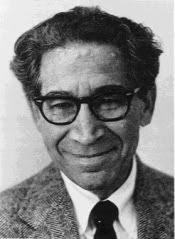
CD is the concept first developed by Leon Festinger when he studied the flying Soucer cult he wrote of in the book When Prophesy Fails (early 50s). Some of the major people in that cult went to become some of the major people in dionetics.
Story:
The cult was centered around a woman who did automatic writing. He received a message that the world would end. The group wound up watching an early sci fi tv show called "Captain Video and his Video Rangers" to recieve message from the saucer people (here is a link to an actual episode of Captain Video
http://www.archive.org/details/Capta...d_By_Yugi_Moto)

Festinger
Festinger heard of the cult and as he was writing his dissertation in psychology he joined the cult as a participant observer. He observed that over time many predictions were made and every time a prediction failed to come true contrary to what one would think the members became even more committed. These were major predictions. People were giving away their houses, and giving away their cars, they were ready the saucers to come and take them to save them from the end. Instead of saying "wow I sold my house and quite my job to wait for the space people and they didn't come man I was sucker, never again will I do this!" NO! they did not! They become more committed. They made bigger comiitents they believed more passionately.
The book is really worth reading as old as it is, it's hilarious all the stuff they did they seem like nuts. But they were normal middle class people and Festinger developed a whole theory of psychology based upon their antics.
The principle of CD as accepted and became very important in advertising. Advertisers used it throughout the 60s and probably still use it now. The old slogan "wouldn't you really rather have a Buick" is an example of that use.
Our minds seek equilibrium, peace. We want to feel ok. When we make big commitments we have a sense of disequilibrium (dissonance) because there'sa conflict, did we do the right thing? So to find equilibrium again we become more committed to our choice. Even if it proves wrong we still go n with it more passionately becasue it gives us equilibrium. I didn't really screw up it will still prove to be true.
Thomas Kuhn's theory of the Pradigm shift proves true at this point becasue the fine disequilibrium is reached when there are too many anomalies and the paradigm can't hold or can't absorb them. The paradigm shifts and we commit to the paradigm even more than to the old.
I was an atheist when I read Festinger (in my undergrad days back in the 70s) and I said 'this is disproves Christianity. This is what happened with the resurrection of Jesus." In fact Festinger actually wrote about that. What I could not see at the time was that it applies to atheism too. Atheists are human, they have human psychology, why they escape DC when it's a basic norm of human psychology?
Atheists who are raised in a religious environment and then grow up with a strong fear of hell and then discord that belief have to become totally committed to atheism to stifle their fear of hell. Even if you don't sit around biting your nails agonizing over hell, even if you have reached a level of maturity where you can see that hell is not true because the concept is too childish,there will still be a sense of fear and guilt in the back of your mind; I threw off the things Mom and Dad taught me they are ashamed, if hell is real I will go there, all submerged in the unconscious.
This is why when biased concepts of atheism are disproved clearly and with a huge truck load of data (such as the idea that religion is mental illness) some atheists just refuse to even consider the data. They don't even have to be aware of making a choice it's just an automatic thing, the need for equilibrium creates grater commitment to the choice even if evidence creates a doubt.
I have no solution. I don't know what can be done to cheat psychology, but I think becoming aware of the process would be the first step in overcoming it. Both sides should overcome it because it hinders logical decision making. I don't know if belief in God or rejection thereof could be a truly passionless logical process. But I think the more self aware we are the better off we are.
__________________Story:
The cult was centered around a woman who did automatic writing. He received a message that the world would end. The group wound up watching an early sci fi tv show called "Captain Video and his Video Rangers" to recieve message from the saucer people (here is a link to an actual episode of Captain Video
http://www.archive.org/details/Capta...d_By_Yugi_Moto)

Festinger
Festinger heard of the cult and as he was writing his dissertation in psychology he joined the cult as a participant observer. He observed that over time many predictions were made and every time a prediction failed to come true contrary to what one would think the members became even more committed. These were major predictions. People were giving away their houses, and giving away their cars, they were ready the saucers to come and take them to save them from the end. Instead of saying "wow I sold my house and quite my job to wait for the space people and they didn't come man I was sucker, never again will I do this!" NO! they did not! They become more committed. They made bigger comiitents they believed more passionately.
The book is really worth reading as old as it is, it's hilarious all the stuff they did they seem like nuts. But they were normal middle class people and Festinger developed a whole theory of psychology based upon their antics.
The principle of CD as accepted and became very important in advertising. Advertisers used it throughout the 60s and probably still use it now. The old slogan "wouldn't you really rather have a Buick" is an example of that use.
Our minds seek equilibrium, peace. We want to feel ok. When we make big commitments we have a sense of disequilibrium (dissonance) because there'sa conflict, did we do the right thing? So to find equilibrium again we become more committed to our choice. Even if it proves wrong we still go n with it more passionately becasue it gives us equilibrium. I didn't really screw up it will still prove to be true.
Thomas Kuhn's theory of the Pradigm shift proves true at this point becasue the fine disequilibrium is reached when there are too many anomalies and the paradigm can't hold or can't absorb them. The paradigm shifts and we commit to the paradigm even more than to the old.
I was an atheist when I read Festinger (in my undergrad days back in the 70s) and I said 'this is disproves Christianity. This is what happened with the resurrection of Jesus." In fact Festinger actually wrote about that. What I could not see at the time was that it applies to atheism too. Atheists are human, they have human psychology, why they escape DC when it's a basic norm of human psychology?
Atheists who are raised in a religious environment and then grow up with a strong fear of hell and then discord that belief have to become totally committed to atheism to stifle their fear of hell. Even if you don't sit around biting your nails agonizing over hell, even if you have reached a level of maturity where you can see that hell is not true because the concept is too childish,there will still be a sense of fear and guilt in the back of your mind; I threw off the things Mom and Dad taught me they are ashamed, if hell is real I will go there, all submerged in the unconscious.
This is why when biased concepts of atheism are disproved clearly and with a huge truck load of data (such as the idea that religion is mental illness) some atheists just refuse to even consider the data. They don't even have to be aware of making a choice it's just an automatic thing, the need for equilibrium creates grater commitment to the choice even if evidence creates a doubt.
I have no solution. I don't know what can be done to cheat psychology, but I think becoming aware of the process would be the first step in overcoming it. Both sides should overcome it because it hinders logical decision making. I don't know if belief in God or rejection thereof could be a truly passionless logical process. But I think the more self aware we are the better off we are.
Metacrock
No comments:
Post a Comment